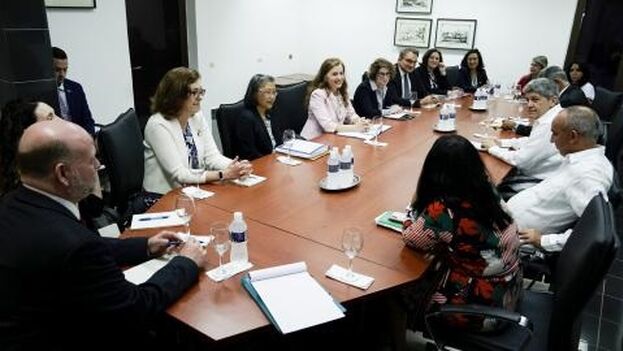
![]() 14ymedio, Madrid, 10 November 2022 — The two senior American officials who were in Cuba these last two days not only talked to their counterparts on the island about migration. According to a statement released on Wednesday by the U.S. Embassy in Cuba, Rena Bitter, Undersecretary of Consular Affairs of the State Department, also expressed to the Cuban officials their “concern” about the human rights situation and asked the Government to “unconditionally release” all political prisoners.
14ymedio, Madrid, 10 November 2022 — The two senior American officials who were in Cuba these last two days not only talked to their counterparts on the island about migration. According to a statement released on Wednesday by the U.S. Embassy in Cuba, Rena Bitter, Undersecretary of Consular Affairs of the State Department, also expressed to the Cuban officials their “concern” about the human rights situation and asked the Government to “unconditionally release” all political prisoners.
Both Bitter and Ur Mendoza Jaddou, director of the U.S. Citizenship and Immigration Service, visited Havana at the end of a work tour that also included Guyana and Miami.
At their meetings on the Island, the officials discussed issues such as the complete resumption of immigrant visa procedures at the Embassy in Havana, beginning on January 4, and diversity visas. In addition, they advanced the resumption of the processing of K visas for fiancés in the same diplomatic headquarters.
Both met on Wednesday with the Cuban Deputy Foreign Minister, Carlos Fernández de Cossío, the Chancellery reported in a statement, which doesn’t allude to the issue of human rights, as the U.S. statement does.
On the contrary, the document alludes to the suspension five years ago, by the previous U.S. Administration, of the consular services “under a pretext discarded by scientists and official reports,” the so-called “Havana Syndrome,” the health incidents suffered by American and Canadian diplomats, which Cuba denies.
The Deputy Foreign Minister also reproached its northern neighbor for having granted Cubans in recent years only about 4,000 visas per year, when “in the 1984 immigration agreements the United States committed to grant at least 20,000 visas per year.”
The lament continues: “In the last five years, Cubans were forced to go to third countries for all their procedures, which increases the costs, without certainty of approval, and there are those who are committed to an irregular migration that puts lives in danger,” he said, referring to Guyana and the Cubans who leave through Nicaragua and on boats.
In Georgetown, on Monday, the U.S. diplomatic headquarters published a photo of Bitter and Mendoza Jaddou along with the Minister of Human Services and Social Security of Guyana, Vindhya Persaud, and the Minister of Foreign Affairs, Hugh Todd, indicating in a message that they discussed the process of international adoptions of The Hague and “reduced waiting times for nonimmigrant visas in Guyana.”
The exodus from the Island has exceeded 224,000 people in just one year, a figure that is far greater than the previous major migratory waves of the Island, in 1980 and 1994, and one that grows day by day.
Translated by Regina Anavy
____________
COLLABORATE WITH OUR WORK: The 14ymedio team is committed to practicing serious journalism that reflects Cuba’s reality in all its depth. Thank you for joining us on this long journey. We invite you to continue supporting us by becoming a member of 14ymedio now. Together we can continue transforming journalism in Cuba.
